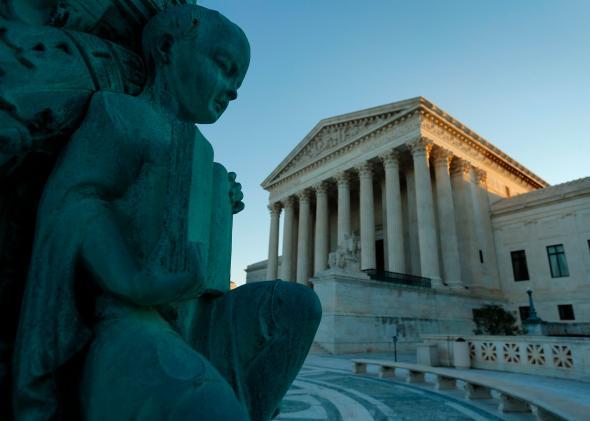In a startling and unexpected move, on Monday the Supreme Court refused to review seven gay marriage cases from five different states. That decision effectively legalized gay marriage in those five states—Indiana, Oklahoma, Utah, Virginia, and Wisconsin—almost immediately. But within the next few weeks, the court’s move will likely bring gay marriage to six more states—meaning that, without actually ruling on the topic, the justices will have brought marriage equality to 11 states in one fell swoop.
Here’s how that works. Technically speaking, the court’s decision merely let the rulings of the 4th, 7th, and 10th circuit courts stand. Each of those courts had found that gay marriage bans violate the U.S. Constitution. But each court also stayed its ruling, assuming, quite reasonably, that the Supreme Court would ultimately step in and decide the issue.
But the Supreme Court has now officially refused to step in—and that makes gay marriage the “law of the circuit” in the 4th, 7th, and 10th circuits. Every state within each circuit, in other words, is now bound by a ruling that all gay marriage bans are unconstitutional.
What does that mean in practice? Among the states in the 4th Circuit, North Carolina, South Carolina, and West Virginia do not yet allow gay marriage. Among the states in the 10th Circuit, Kansas, Wyoming, and Colorado do not yet allow gay marriage. But the law of the 4th and 10th circuits states that gay marriage bans violate the Constitution. Lower court judges in Colorado, Kansas, North Carolina, South Carolina, West Virginia, and Wyoming, then, are now legally obliged to strike down their states’ gay marriage bans.
Luckily for marriage equality proponents, a gay marriage case is already pending in every single one of those states. Soon, then, the judges overseeing each case should grant summary judgment in favor of marriage equality. Gay marriage opponents won’t have much incentive to appeal the decisions; the appeals courts for each state have already found that gay people have a constitutional right to wed. Within a few weeks, expect to see marriage equality arrive in Colorado, Kansas, North Carolina, South Carolina, West Virginia, and Wyoming—for good.
Update, Oct. 6, 2014: I asked Evan Wolfson, founder and president of Freedom to Marry, what he thought would happen in these six states.
“The law is clear,” he told me. “Each of these states is in a circuit where the Supreme Court let stand a freedom to marry ruling. And that is binding on those states. I think in some of those states, marriage is going to begin as soon as today. There should be no need to go to court.” In other words, state attorneys general may simply direct county clerks to start issuing marriage licenses to gay couples, in accordance with the law of the circuit. Colorado’s attorney general has already directed gay marriages to begin.
In states with vehemently anti-gay governors and attorneys general, however, “There may have to be some extra steps taken, such as [gay couples] getting a court order.” Still, Wolfson told me, “It’s crystal clear where each of these states is going end up—it’s just not exactly clear how some of them may get there.”
Update II, Oct. 6, 2014: Make that 12—or maybe 11 and a half. Following the Supreme Court’s announcement, Missouri’s attorney general has announced that he will not appeal a recent state court decision forcing Missouri to recognize gay marriages performed out-of-state. For now, gay marriages still cannot be performed in-state. But the writing is quite clearly on the wall.
